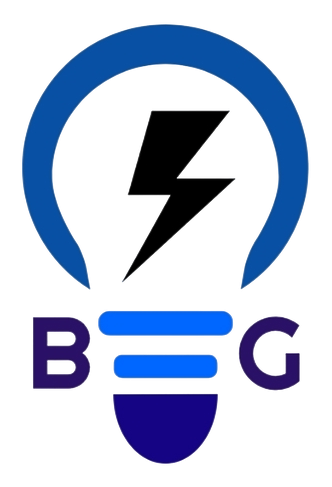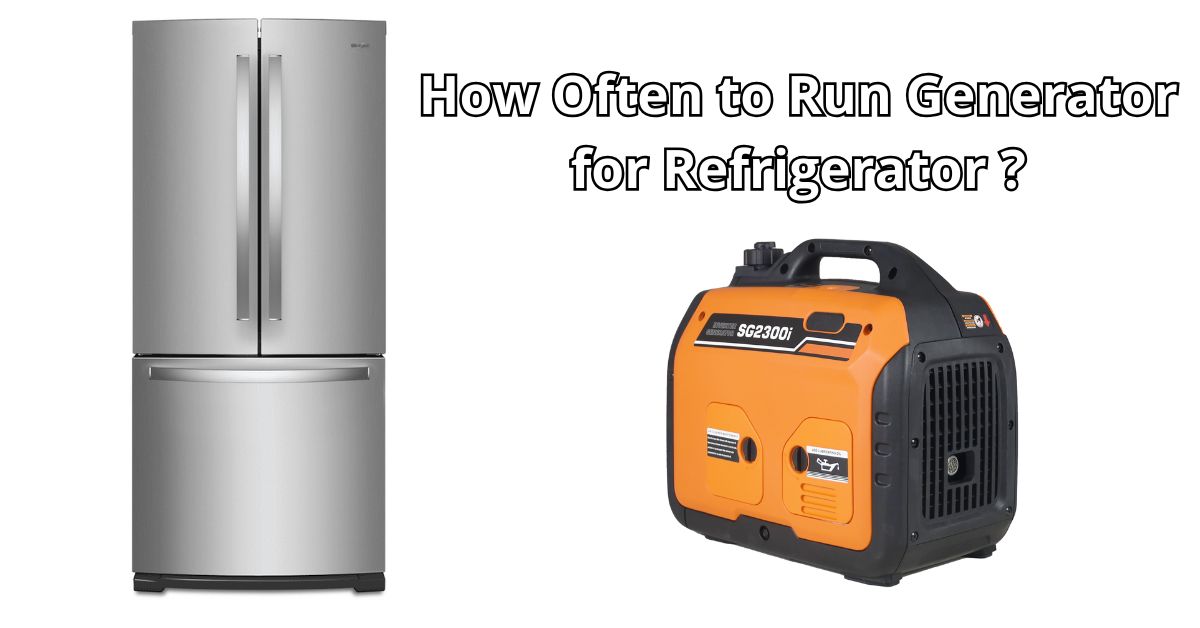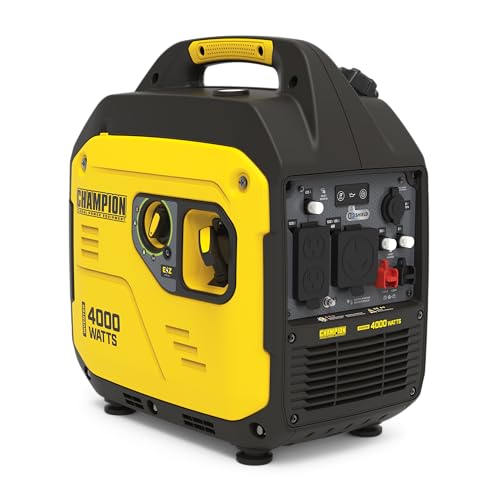How Often to Run Generator for Refrigerator: Essential Guide
To keep your refrigerator running smoothly during power outages, you need a generator. But how often should you run it?
The answer depends on various factors such as the generator’s capacity and the refrigerator’s energy needs. Running a generator efficiently is key to maintaining your refrigerator’s performance. This is especially true during emergencies. Knowing the right frequency can save fuel and prolong your generator’s lifespan.
It also ensures that your stored food stays fresh and safe to consume. In this guide, we’ll explore the optimal running times for your generator. You’ll learn how to balance energy use and maintain your refrigerator effectively. So, let’s dive in and find out how to keep your refrigerator running smoothly with the right generator schedule.
Importance Of Running A Generator
The importance of running a generator for your refrigerator cannot be overstated. Power outages can happen anytime. During these times, keeping your refrigerator running is crucial. A generator ensures your fridge stays operational. This prevents food from spoiling. It also maintains the efficiency of the appliance.
Preventing Food Spoilage
Food spoilage is a significant concern during power outages. Your refrigerator needs a constant power supply. Without it, the temperature rises. This can lead to food spoilage within hours. Running a generator helps avoid this. It keeps your fridge at the right temperature. This ensures your food stays fresh longer.
Maintaining Refrigerator Efficiency
Regularly running a generator also helps maintain your refrigerator’s efficiency. Power outages can strain the appliance. This can lead to wear and tear. Using a generator reduces this stress. It provides a stable power supply. This helps your refrigerator run smoothly. It also extends the appliance’s lifespan. Regular use of a generator can save you money in the long run.

Factors Affecting Generator Use
Running a generator for your refrigerator depends on several factors. These factors determine how often you need to use your generator.
Understanding these can help you make informed decisions. Let’s explore some key factors.
Weather Conditions
Weather affects generator use significantly. Hot weather can make your refrigerator work harder. This means it needs more power. You may need to run your generator more often in summer.
Cold weather can also impact usage. If it’s extremely cold, your refrigerator might not need as much power. This can reduce the frequency of generator use. Always consider the current weather when planning generator use.
Power Outage Duration
The length of a power outage is crucial. Short outages might not need frequent generator use. A refrigerator can keep food cold for a few hours without power.
Long outages change things. Food can spoil if the refrigerator stays off too long. In such cases, running the generator more often is necessary. Always track the duration of power outages to decide on generator use.
Recommended Run Time
Running a generator for your refrigerator ensures your food stays fresh during power outages. Knowing the right run time is crucial to avoid overusing your generator. This helps maintain your refrigerator’s efficiency and prevents food spoilage.
Short-term Outages
For short-term outages, run the generator for 1 to 2 hours. This keeps the refrigerator cool and preserves your food. You don’t need to run it continuously. The refrigerator can retain its temperature for several hours after being powered. Check the temperature inside the fridge regularly. If it rises above 40°F, run the generator again for another hour.
Long-term Outages
During long-term outages, it’s essential to be more strategic. Run the generator for 3 to 4 hours every 8 hours. This ensures the refrigerator maintains a safe temperature. Avoid opening the refrigerator door frequently. Each time you open it, cold air escapes. This makes the generator work harder. Monitor the fridge temperature closely. If needed, adjust the run time accordingly.
Energy Consumption Considerations
Understanding energy consumption considerations is crucial when running a generator for a refrigerator. This helps in managing costs and ensuring efficiency. Let’s delve into key aspects: fuel efficiency and cost implications.
Fuel Efficiency
Fuel efficiency is vital for running a generator economically. A generator’s fuel consumption varies based on its size and load. A refrigerator typically consumes around 1 to 2 kWh per day. Hence, select a generator that matches this consumption rate.
Here is a table to illustrate the average fuel consumption:
| Generator Size (Watts) | Fuel Consumption (Liters/Hour) | Refrigerator Running Time (Hours) |
|---|---|---|
| 1000W | 0.5 | 24 |
| 2000W | 0.75 | 12 |
| 3000W | 1.0 | 8 |
Cost Implications
Running a generator has cost implications. It’s important to calculate the expenses. This includes fuel costs and maintenance. Use this formula for a rough estimate:
Cost = Fuel Consumption (Liters/Hour) Fuel Price (Per Liter) Hours Run
For example:
- Fuel Consumption: 0.5 Liters/Hour
- Fuel Price: $1.2 per Liter
- Hours Run: 24
So, the cost would be:
Cost = 0.5 1.2 24 = $14.4
Additionally, consider maintenance costs like oil changes and filter replacements. Regular maintenance ensures longevity and efficiency.
Safety Measures
When using a generator to power your refrigerator, safety is crucial. Without proper safety measures, you risk damaging your appliances or even causing harm. This section will guide you through essential safety steps.
Proper Ventilation
Ensure your generator is in a well-ventilated area. Generators produce carbon monoxide, a dangerous gas. Never run a generator indoors or in an enclosed space.
Place the generator at least 20 feet from your home. Make sure the exhaust points away from windows and doors. Proper ventilation can prevent carbon monoxide poisoning.
Preventing Overload
Avoid overloading your generator. Check the wattage requirements of your refrigerator. Add the wattage of any other appliances you plan to run. Ensure your generator can handle the total wattage.
Overloading can damage your generator and appliances. Use a wattage calculator if you are unsure. Follow the manufacturer’s guidelines to prevent overload.
Maintenance Tips
To ensure your generator runs smoothly and efficiently, you need to follow some essential maintenance tips. These tips can help prolong the life of your generator and keep your refrigerator running without interruptions.
Regular Servicing
Regular servicing of your generator is crucial. It involves checking all parts and ensuring they are in good condition. A professional technician can help with this. They will inspect the engine, clean filters, and check for any wear and tear. Schedule servicing at least once a year. This can prevent unexpected breakdowns.
Checking Fuel Levels
Always check the fuel levels before starting your generator. Low fuel can cause the generator to stop suddenly. This can damage your refrigerator. Keep the fuel tank full. It’s also good to use fresh fuel. Old fuel can clog the engine. This makes it harder for the generator to run smoothly. Make it a habit to check fuel levels regularly.
Alternative Power Solutions
When considering alternative power solutions for your refrigerator, two popular options stand out. These are solar power and battery backups. Both offer reliable and efficient ways to keep your refrigerator running without relying solely on a generator.
Solar Power Options
Solar power is a sustainable and cost-effective solution. It uses solar panels to convert sunlight into electricity. This energy can then power your refrigerator. Here are some key benefits:
- Renewable Energy: Solar power is a renewable energy source. It helps reduce your carbon footprint.
- Cost Savings: Once installed, solar panels reduce electricity bills.
- Low Maintenance: Solar panels require minimal maintenance.
To set up a solar power system, you need:
- Solar Panels
- Charge Controller
- Inverter
- Batteries
The solar panels collect sunlight. The charge controller regulates the energy flow. The inverter converts DC to AC power. The batteries store excess energy for later use.
Battery Backups
Battery backups are another reliable alternative. They provide power during outages. Here are some advantages:
- Continuous Power: Batteries ensure your refrigerator runs without interruption.
- Quiet Operation: Battery backups are silent compared to generators.
- Portability: Easy to move and use in different locations.
To use a battery backup system, you need:
- Batteries
- Battery Charger
- Inverter
The batteries store electrical energy. The battery charger keeps the batteries charged. The inverter converts stored energy to power your refrigerator.
Both solar power and battery backups offer effective solutions. They ensure your refrigerator keeps running smoothly. Choose the one that best fits your needs and budget.
Troubleshooting Common Issues
Running a generator for your refrigerator can sometimes lead to issues. Knowing how to troubleshoot common problems can save you time and stress. This section covers some frequent issues and their solutions.
Generator Fails To Start
A generator that fails to start can be frustrating. First, check the fuel level. No fuel means no power. Next, examine the spark plug. A dirty or damaged spark plug needs replacing. Also, inspect the air filter. A clogged air filter can prevent the generator from starting. Finally, ensure the choke is in the correct position. An incorrect choke setting can cause starting problems.
Refrigerator Not Cooling
If your refrigerator isn’t cooling, the generator might not be providing enough power. Ensure the generator’s wattage matches the refrigerator’s requirements. Also, check the power cord connections. Loose or damaged cords can disrupt power flow. Another reason could be a faulty thermostat in the refrigerator. A malfunctioning thermostat won’t signal the cooling cycle. Lastly, clean the condenser coils. Dirty coils can impede cooling performance.
Frequently Asked Questions
How Often Should I Run My Generator For My Refrigerator?
Run your generator for your refrigerator every 4 hours during a power outage. This ensures the fridge maintains a safe temperature to keep food fresh.
Can A Generator Damage My Refrigerator?
A properly functioning generator won’t damage your refrigerator. Ensure the generator provides stable power and meets the fridge’s wattage requirements.
How Long Can A Refrigerator Run On A Generator?
A refrigerator can run on a generator as long as needed, provided the generator has sufficient fuel and power capacity.
What Size Generator Do I Need For A Refrigerator?
A generator with at least 2000 watts is recommended for most refrigerators. Check your fridge’s wattage to confirm the exact requirement.
Conclusion
Running your generator for your refrigerator regularly is crucial. It ensures your food stays fresh and safe. Aim for around two hours every 8-12 hours. This keeps everything cold without overworking your generator. Always check fuel levels and maintenance needs.
Stay consistent with this routine. Your refrigerator and your food will thank you. Regular usage helps avoid spoilage. It also extends the life of your appliance. Keep your generator in good condition for optimal performance.






